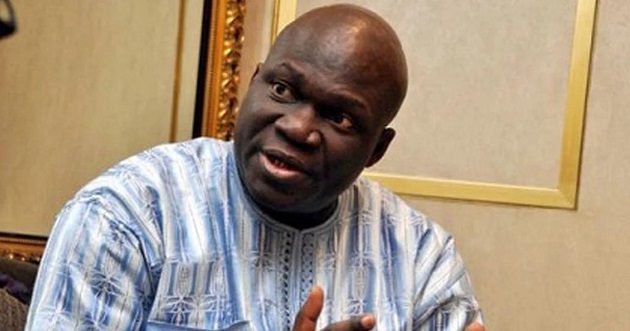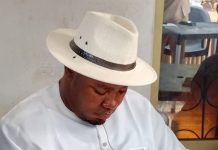One of the highlights of the recent celebrations of Democracy Day, on June 12, was the series of anniversary lectures organized to mark 25 years of Unbroken Democracy in Nigeria. At the Presidential Villa, Alhaji Bello Masari, former Speaker of the House of Representatives was Guest Lecturer on the subject: “25 Years of Enduring Democracy: Prospects for the Future”. In Abeokuta, Ogun State, at the June 12 Cultural Centre, Kuto, the Ogun State Government held a public lecture with the theme: “June 12-Defining Moment in the Democratic Development in Nigeria.” There was also a 2024 Democracy Day Lecture organized by the Aminu Kano Centre for Democratic Research and Training in collaboration with SEDSAC: Humanitarian Initiative titled “Democracy and The Nigerian Citizens: Profit or Loss?” The lecture was delivered by Dr. Sa’idu Dukawa. There were activities in other parts of Nigeria as well.
It is interesting to see how June 12, its symbolism and place in Nigerian history has become a rallying point, that it was originally, and the man whose martyrdom underlines that symbolism, Chief MKO Abiola has now been accorded a rightful, and due recognition in the annals of Nigerian history for all that he did to champion the cause of democracy. This is both interesting and remarkable because indeed in this same country, many of those who benefitted from the democratic struggle conveniently revised the story of June 12. In the South West however, MKO Abiola Day was celebrated in Lagos, Oyo, Ondo, Ogun and Osun states. The Federal Government of Nigeria celebrated Democracy Day on May 29, the day Nigeria transitioned from decades of uninterrupted military rule to civilian rule in 1999. Despite the celebration of MKO Abiola across the South West – his statues were erected, streets, stadiums, schools and public buildings were named after him, and even with Lagos State iconizing some of the non-Yoruba heroes of the struggle, including Rear Admiral Ndubuisi Kanu, Bagauda Kaltho and many others, some revisionists came up with the patently false narrative that June 12 was a Yoruba, South-West affair.
There were attempts to lobby the Nigerian Government to do the right thing: declare Abiola, the winner of the annulled June 12, 1993 Presidential election, grant him a post-humous national honour and make restitution for the injustice of 1993, beyond the fact of the political solution of 1999 which ensured that the two major contenders for the Presidency post-military era were Yorubas: Chief Olusegun Obasanjo (PDP) and Chief Olu Falae (AD/APP). The closest that Abiola and June 12 were acknowledged at the centre was in 2014 at the Nigeria Centenary Awards, honouring 100 remarkable individuals who have made great impact in the making of Nigeria in the last century. The Abiola family did not think listing their patriarch among a long list of persons including Lord Lugard and his consort, Flora Shaw was good enough. The family turned down the award. Despite this politics of acknowledgement, MKO Abiola and June 12 nonetheless lived on in the hearts and on the tip of the pens of many: the media, civil society, artists across the genres and more importantly, the progressives who gathered at his graveside, every June to remember and honour him.
The attempt to reduce MKO and the June 12 phenomenon to a narrow, ethnic moment has also been exposed for the lie that it is in the growing bibliography on the subject by both scholars and direct observers/participants. These writings include, Heroes of Democracy by Joe Igbokwe, June 1993: Annulment by Abraham Oshoko, Frank Kokori, The Struggle for June 12, Omo Omoruyi, The Tale of June 12: The Betrayal of the Democratic Rights of Nigerians; Wale Oshun, The Open Grave: NADECO and the Struggle for Democracy and Clapping With One Hand: June 12 and the Crisis of a State Nation; Humphrey Nwosu, Laying the Foundation for Nigeria’s Democracy: My Account of June 12, 1993; Abimbola Aboderin, Democracy and the Untold Story of June 12; Deba Uwadiae, Abiodun Adeniyi, Emeka Nwosu and Segun Olanipekun, Nigeria’s Aborted Third Republic and the June Debacle: Reporters’ Account and Wole Soyinka’s memoir, You Must Set Forth At Dawn. The major turning point arrived on June 6, 2018 when then President Muhammadu Buhari changed Democracy Day from May 29, to June 12. As Buhari put it, “June 12 was the day when Nigerians in millions expressed their democratic will in what was undisputedly the freest, fairest and most peaceful elections since our independence. The fact that the outcome of that election was not upheld by the then military government doesn’t distract from the democratic credential of that process. Accordingly, after due consultations, the Federal Government has decided that henceforth June 12, will be celebrated as Democracy Day. Therefore, the government has decided to award posthumously the highest honour of the land GCFR, to the late Chief MKO Abiola, the presumed winner of the June 12, 1993 cancelled elections.” President Buhari sent a Public Holiday Amendment Bill to the National Assembly to remove May 29 as a public holiday and replace it with June 12. This was approved by the Senate. On Monday, June 10, 2019, President Buhari assented to the Bill. This was an act of courage and bold assertiveness that would for long be remembered as a key aspect of Buhari’s legacy. Other Presidents before him skirted around the Abiola and June 12 question or avoided it altogether, including Abiola’s kinsman, President Olusegun Obasanjo who had once quipped that “Abiola is not the Messiah Nigeria needs”. Buhari considered Abiola’s messianism so important, he gave him the highest honour in the land, placing him at the same rank as Nigerian Presidents and former Heads of State. He stopped short of declaring him the winner of the June 12, 1993 Presidential election, but he made it clear that the Abiola story is the Nigerian story. He practically shut up the reductionists and revisionists. With the amendment of the Public Holidays Act, turning June 12 into a national holiday, Buhari affirmed the nationalism of both Abiola and June 12. This was a special moment of epiphany for the President. He made a mark where others before him could not tread. The MKO Abiola story is a mix of narratives, false and true, intrigues, treachery, contradictions and tropes of disambiguation. Every year since 2019, the festival and the stories get re-enacted every June 12.
READ ALSO:OPINION: Slush funds for dubious petrol subsidy payments
I was invited to one of such special events, and for reasons of convenience and proximity, public and private, I was at the Lagos State House of Assembly Complex, Alausa, Ikeja to attend the commemoration of 25 years of Unbroken Democratic Governance in Nigeria put together by Rt. Hon. Mudashiru Obasa and his colleagues. It was an evening event, a gala night, designed in the shape of a cocktail, with greater emphasis on discussions and reflections on key themes about Nigeria’s democratic process. A total of ten guest speakers had been invited to speak on different aspects of the democratic project in Nigeria, drawn from government, business, and the diplomatic community. The guest list was broadly inclusive: members of the Lagos state House of Assembly, the Executive and Judicial Arms of Government, past and present, the civil society, academia, traditional rulers and chiefs, business chieftains, members of the diplomatic corps, the Lagos Governance Advisory Council, chairmen and officials of Local Governments and LCDAs in Lagos and general ladies and gentlemen. The hall was filled up.
The Lagos State House of Assembly section of the Secretariat in Alausa is a sprawling architectural wonder unto itself, with halls and large passageways, beautified and designed to give the lawmakers the dignity that befits that arm of government. As is to be expected the Assembly’s invitation was honoured. Oftentimes, when stories are told about State Houses of Assembly, it could be when the members are quarrelling with the Executives over budgetary allocations or the Governor needs their services to impeach an errant Deputy Governor. For the most part, State Houses of Assembly, especially in states where the ruling party in the state controls the majority in the House do their work obediently. They simply do as the Governor wishes. It was therefore refreshing to hear that a State House of Assembly wanted to do something that requires some serious thinking and reflection. I carried my two eyes and two legs to go and see.
There were ten speakers, including Mr. Babatunde Raji Fashola, SAN, former Governor of Lagos State (2007 – 2015) speaking on “Federalism: The Quest for a Perfect Union”, Hon. Abike Dabiri-Erewa, CEO, Nigerians in Diaspora Commission (NIDCOM) on “The Role of Nigerian Women in Nation-Building”, Mr. Debo Adeniran, Chairman Centre for Anti-Corruption and Open Leadership (CACOL) on “The Concept of Democracy and Human Rights”; Dr. Muda Yusuf, Director, Centre for the Promotion of Private Enterprises (CPPE) and former DG, Lagos Chamber of Commerce and industry offering “Economic Perspective on Nigeria’s Democratic Governance, Professor Eghosa Osaghae, DG, Nigerian Institute of International Affairs (NIIA) on “Nigerian Foreign Policy in a Democracy: Gains and Prospect” in addition to the Consul General of the French Embassy, Laurent Favier, Weert Buerner, the Consul General of Germany; Ugo Boni, the Consul General of Italy, Jonny Baxter, the British Deputy High Commissioner, Michael A. Ervin, US Political and Economic Chief in Lagos – all on “Foreign Perspectives on Nigeria’s Democratic Governance”. This was quite a broad range of topics and speakers, which I thought was rather long, but surprisingly everyone showed up and the evening soon got off to a spirited start. I was even more surprised that despite the design of the programme as an evening cocktail, with the people standing, people stood through it all till the end. Every Speaker had the chance to speak for about ten minutes. I recall a number of highlights.
Hon Mudasiru Obasa, Speaker of the Assembly made an eloquent case for the role that the Lagos State House of Assembly has played in the democratic governance of Nigeria in the context of its own jurisdiction. Obasa was even generous enough going all the way back to the very first session of the House in October 1979 to date, that is – far beyond the 25-year reference term. He disclosed that the Lagos House specifically since 1999 has passed over 300 laws and 2,000 resolutions, many of which have become models for other State Houses of Assembly. Obasa is one of the longest serving legislators and Speakers in Nigeria. He has been a legislator since 2007 and Speaker of the Lagos Assembly since 2015. There must be something he does right that endears him to his constituency (Agege 1) and to his colleagues in Alausa. I was struck by two of his statements when he said, after paying tributes to the heroes of June 12, that “It is a duty to also remember those who are responsible for the annulment of that democratic process, some alive, some dead…This is also to remind those who are coming behind us that the democracy we are enjoying today was built by some people, some of whom lost their lives and properties.”
Earlier the same day, in Abuja, President Bola Tinubu had delivered a Democracy Day Speech which was marred by the treatment of MKO Abiola in parenthesis, and the omission of many important heroes. The event in Abuja was also reduced by the thoughtless, sycophantic unveiling of a poorly painted portrait of President Tinubu at the Eagle Square on June 12. Obasa’s list was far more comprehensive and detailed than the President’s. And he did not forget to name and chide those who stood in the way of the people’s struggle, noting that “history will not forget all their roles while sabotaging the democratic progress of this nation”. Still, many names remain left out of the accounts simply because June 12 was truly the people’s struggle. How come Professor Humphrey Nwosu, the man who presided over the freest and fairest election in Nigeria has been forgotten? He was a hero. And why are we not naming the promoters of Association for Better Nigeria (ABN) by Arthur Nzeribe and Abimbola Davies, the disgraceful Youths Earnestly Ask for Abacha (YEAA) led by Daniel Kanu, rogue judges, and the hungry traditional rulers who identified with Abacha. Obasa’s list helped to give a fuller picture, more names and groups would still have to be called out for their role in the June debacle.
Mr. Fashola, SAN echoed the same thoughts that we must ensure that democracy remains unbroken, and lawmakers have a crucial role to play in protecting democratic values, justice and human rights. Fashola posited that Nigeria is running a Federal system but the challenge is to make the system more perfect to protect individual rights. He believes that progress has been made in the past 25 years but there are still areas of improvement, citing the need for the Lagos Assembly to make laws, for example, to compel landlords in Lagos State not to collect rent for one or two years as is the norm. Mrs. Dabiri-Erewa made a case for women empowerment which naturally drew cheers from the women folk in attendance. Mr Adeniran was clear-minded about the important role of the civil society in Nigeria’s democratic process. Dr. Muda Yusuf said democracy must be protected to protect and attract investment, and thus promote prosperity. The diplomats from France, Germany, Italy, UK, and US in unison and almost in a rehearsed manner congratulated Nigerians and urged us to sustain and consolidate democratic rule.
It is easy to hold talks in Nigeria, and commemorate anniversaries but the key challenge is for our leaders to walk the talk and live up to the same ideals and values that they espouse. In all, June 12 is about us, our country and how seriously we take ourselves and our future. The Lagos State House of Assembly should organize more events, to provide opportunities for interaction with the public, on key subjects and ideas which may not necessarily fall under the purview of public hearing. There are 40 members in the Lagos House, representing 20 Local Government Areas further sub-divided into Local Council Development Areas, with two members representing a Local Government. I met one of the members who introduced herself as Okanlawon, the only non-APC member in the Lagos Assembly. I predicted to her verily, that she would be a member of the APC before the 2027 election, given the nature of Nigerian politics. In the future, the Lagos State House of Assembly should allow us to sit down at public events of the type they had on June 12, and there should be room for interventions by the audience. Altogether, that was a good outing.
ERRATUM: In this column last week: “A Day With Seyi Makinde,” (June 11), I wrote that “Governor Makinde is the only Governor to have broken the jinx of a second term in office in Oyo State.” My attention has been drawn to the fact that the honour of being the first to do so, belongs to late Senator Abiola Ajimobi, nicknamed KOSELERI, Oyo State Governor, 2011 -2019. I stand corrected. The error is regretted.
AUTHOR: Reuben Abati
Articles published in our Graffiti section are strictly the opinion of the writers and do not represent the views of TVN or its editorial stand.
The post OPINION …June 12: Democracy Day With Lagos Lawmakers appeared first on Latest Nigeria News | Top Stories from TVN.
Join Television Nigerian Whatsapp Now
Join Television Nigerian Facebook Now
Join Television Nigerian Twitter Now
Join Television Nigerian YouTUbe Now





